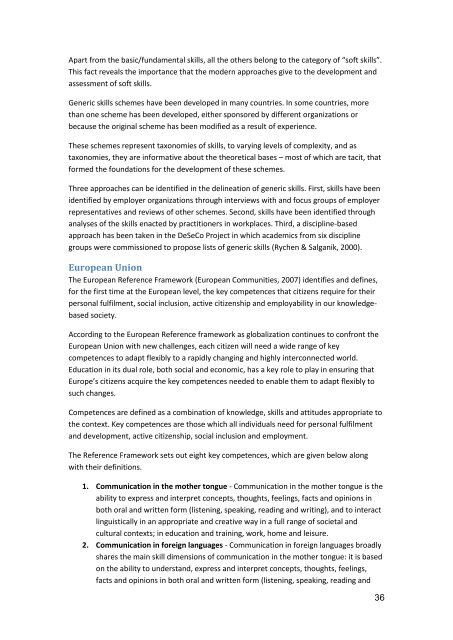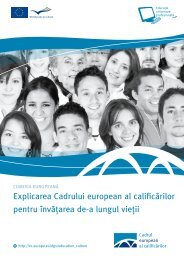Teaching and Assessing Soft Skills - MASS - Measuring and ...
Teaching and Assessing Soft Skills - MASS - Measuring and ...
Teaching and Assessing Soft Skills - MASS - Measuring and ...
You also want an ePaper? Increase the reach of your titles
YUMPU automatically turns print PDFs into web optimized ePapers that Google loves.
Apart from the basic/fundamental skills, all the others belong to the category of “soft skills”.<br />
This fact reveals the importance that the modern approaches give to the development <strong>and</strong><br />
assessment of soft skills.<br />
Generic skills schemes have been developed in many countries. In some countries, more<br />
than one scheme has been developed, either sponsored by different organizations or<br />
because the original scheme has been modified as a result of experience.<br />
These schemes represent taxonomies of skills, to varying levels of complexity, <strong>and</strong> as<br />
taxonomies, they are informative about the theoretical bases – most of which are tacit, that<br />
formed the foundations for the development of these schemes.<br />
Three approaches can be identified in the delineation of generic skills. First, skills have been<br />
identified by employer organizations through interviews with <strong>and</strong> focus groups of employer<br />
representatives <strong>and</strong> reviews of other schemes. Second, skills have been identified through<br />
analyses of the skills enacted by practitioners in workplaces. Third, a discipline-based<br />
approach has been taken in the DeSeCo Project in which academics from six discipline<br />
groups were commissioned to propose lists of generic skills (Rychen & Salganik, 2000).<br />
European Union<br />
The European Reference Framework (European Communities, 2007) identifies <strong>and</strong> defines,<br />
for the first time at the European level, the key competences that citizens require for their<br />
personal fulfilment, social inclusion, active citizenship <strong>and</strong> employability in our knowledgebased<br />
society.<br />
According to the European Reference framework as globalization continues to confront the<br />
European Union with new challenges, each citizen will need a wide range of key<br />
competences to adapt flexibly to a rapidly changing <strong>and</strong> highly interconnected world.<br />
Education in its dual role, both social <strong>and</strong> economic, has a key role to play in ensuring that<br />
Europe’s citizens acquire the key competences needed to enable them to adapt flexibly to<br />
such changes.<br />
Competences are defined as a combination of knowledge, skills <strong>and</strong> attitudes appropriate to<br />
the context. Key competences are those which all individuals need for personal fulfilment<br />
<strong>and</strong> development, active citizenship, social inclusion <strong>and</strong> employment.<br />
The Reference Framework sets out eight key competences, which are given below along<br />
with their definitions.<br />
1. Communication in the mother tongue - Communication in the mother tongue is the<br />
ability to express <strong>and</strong> interpret concepts, thoughts, feelings, facts <strong>and</strong> opinions in<br />
both oral <strong>and</strong> written form (listening, speaking, reading <strong>and</strong> writing), <strong>and</strong> to interact<br />
linguistically in an appropriate <strong>and</strong> creative way in a full range of societal <strong>and</strong><br />
cultural contexts; in education <strong>and</strong> training, work, home <strong>and</strong> leisure.<br />
2. Communication in foreign languages - Communication in foreign languages broadly<br />
shares the main skill dimensions of communication in the mother tongue: it is based<br />
on the ability to underst<strong>and</strong>, express <strong>and</strong> interpret concepts, thoughts, feelings,<br />
facts <strong>and</strong> opinions in both oral <strong>and</strong> written form (listening, speaking, reading <strong>and</strong><br />
36





